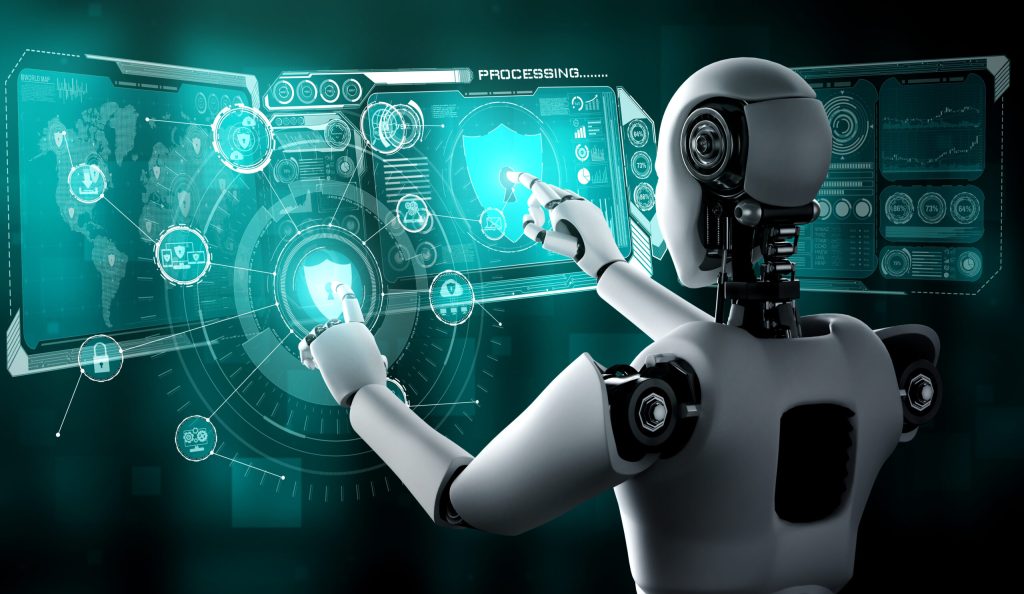Artificial Intelligence (AI) has swiftly evolved from a futuristic concept to one of the most transformative technologies of the 21st century. Its impact on industries worldwide is profound and continues to grow exponentially, particularly in 2024. From healthcare to finance, manufacturing to entertainment, AI is ushering in a new era of innovation and disruption. In this article, we’ll delve into the cutting-edge trends driving the AI revolution, explore its real-world applications across various sectors, and consider the ethical dilemmas that arise with its rapid advancements.
AI’s Transformational Impact on Healthcare
The healthcare industry stands at the forefront of AI innovation, with the potential to significantly enhance patient care, diagnostics, and treatment outcomes. In 2024, we can anticipate even more sophisticated AI-powered tools designed to improve the precision and efficiency of healthcare services. One of the most notable advancements will be in early disease detection, particularly in complex conditions such as cancer. Machine learning algorithms are increasingly being trained to analyze medical images, enabling doctors to detect abnormalities at much earlier stages than traditional methods allow.
AI is also reshaping treatment planning by providing doctors with data-driven insights into the most effective therapeutic options for individual patients. Personalized treatment regimens are becoming more common, as AI systems analyze vast datasets from medical records and research to suggest the best course of action for each patient’s unique circumstances. Beyond diagnostics, AI-driven robotic surgery is another area where remarkable strides are being made. These systems can perform intricate surgeries with incredible precision, minimizing the risk of human error and improving patient recovery times.
In addition to these advancements, AI’s role in patient care is expanding through intelligent virtual assistants and monitoring systems. AI algorithms can track patient health metrics in real-time, alerting healthcare providers to any significant changes or potential issues. This leads to more proactive care, reducing hospital readmissions and enhancing overall patient outcomes. As AI continues to evolve, its integration into healthcare promises to improve both the quality and accessibility of medical services worldwide.
AI’s Role in Revolutionizing Finance
The financial sector has embraced AI technology with open arms, and 2024 is set to witness even more profound changes in this industry. AI’s ability to process vast amounts of data in real time has allowed banks, insurance companies, and investment firms to enhance their operations, improve customer experiences, and minimize risks.
One of the key areas where AI is making a significant impact is fraud detection. Machine learning algorithms are being used to analyze financial transactions and identify suspicious activities that may indicate fraudulent behavior. By continuously learning from historical data, these AI systems are becoming better at detecting even the most subtle signs of fraud, allowing financial institutions to take action before substantial damage occurs.
AI is also helping financial institutions manage risks more effectively. For instance, in the investment sector, AI tools are now used to predict market trends and assist in making more informed investment decisions. These systems analyze historical market data and external variables, such as geopolitical events or economic indicators, to generate accurate forecasts of stock performance, commodities, and other assets. This enables firms to optimize portfolios and mitigate risk with greater precision.
Customer service in banking has also been transformed by AI. Chatbots and virtual assistants powered by AI are now commonplace in financial institutions. These intelligent systems can handle a variety of tasks, from answering customer queries to processing transactions, and even providing personalized financial advice. AI-driven chatbots help improve the customer experience by providing instant support and tailored recommendations based on individual preferences and financial behaviors. This shift not only increases efficiency but also makes banking services more accessible to people around the world.
AI’s Transformation of Manufacturing
Manufacturing is another industry where AI is having a profound impact, particularly through the development of smart factories. In 2024, AI-powered systems, integrated with the Internet of Things (IoT), are becoming the backbone of modern manufacturing operations. These systems enable machines to communicate with each other and work collaboratively, leading to greater automation and efficiency.
One of the key applications of AI in manufacturing is predictive maintenance. AI algorithms analyze data collected from machines to predict when equipment is likely to fail, allowing companies to take preemptive action before breakdowns occur. This reduces downtime, extends the lifespan of equipment, and saves businesses substantial amounts in repair costs. In addition to predictive maintenance, AI is optimizing supply chains by analyzing data on inventory levels, shipping routes, and production schedules. These insights help manufacturers ensure that products are delivered on time, reduce excess stock, and minimize costs associated with logistics.
AI is also playing a role in the design and prototyping phases of manufacturing. Advanced machine learning models are being used to simulate product designs, allowing manufacturers to test and refine concepts before production begins. This not only speeds up the innovation process but also leads to products that are more efficient and cost-effective to produce.
Ethical Considerations and Challenges
As AI technology continues to evolve, ethical considerations have become a critical part of the conversation. While the potential benefits of AI are undeniable, there are significant concerns regarding privacy, security, and the impact on jobs. One of the most pressing issues is data privacy. With AI systems processing massive amounts of personal data, ensuring that this information is protected from breaches and misuse is of paramount importance. Governments, businesses, and individuals must work together to establish robust cybersecurity measures and transparent data usage policies.
Another major concern is algorithmic bias. AI systems are only as good as the data they are trained on, and if this data contains biases, it can lead to skewed or unfair outcomes. For example, in hiring practices, AI algorithms could unintentionally favor certain demographics over others, perpetuating inequalities in the workforce. To combat this, many organizations are actively working to ensure that their AI systems are trained on diverse, representative data and are subject to regular audits to ensure fairness and accountability.
Job displacement is also a major concern as AI continues to automate tasks traditionally performed by humans. While AI creates new opportunities in some areas, it may also lead to job losses in sectors like manufacturing, retail, and customer service. Governments and companies must find ways to address this issue, including offering retraining programs to help workers transition to new roles and industries. Developing policies that ensure a fair and inclusive approach to AI adoption will be essential for mitigating these potential negative impacts.
The Future of AI: What’s Next?
Looking ahead to the future of AI, the possibilities are both exciting and challenging. In 2024, AI is poised to make significant strides in several key areas, including natural language processing (NLP) and quantum computing. Advances in NLP will allow AI systems to understand and respond to human language with even greater accuracy and nuance. This will lead to more intuitive and efficient communication between humans and machines, enabling new applications in customer service, healthcare, education, and more.
Quantum computing, which leverages the principles of quantum mechanics to process information at unprecedented speeds, is expected to revolutionize AI research. While quantum computers are still in the early stages of development, they hold the potential to solve problems that are currently beyond the reach of classical computers, such as simulating complex biological systems or optimizing large-scale supply chains. As quantum computing becomes more powerful, it will accelerate AI innovation and open up new frontiers for scientific discovery and technological progress.
Conclusion: AI’s Lasting Impact on Our Lives
Artificial Intelligence is far more than just a buzzword—it is a transformative force that is reshaping the world as we know it. In 2024, AI’s influence will continue to expand, touching nearly every aspect of our lives. From revolutionizing healthcare and finance to optimizing manufacturing and enhancing customer experiences, AI is becoming an integral part of the global economy. However, as we embrace the benefits of AI, we must also address the ethical challenges that come with it. By doing so, we can ensure that AI is used responsibly, for the greater good of society, and that its potential is realized in a way that benefits all. The future of AI is bright, and its impact will be felt for generations to come.


